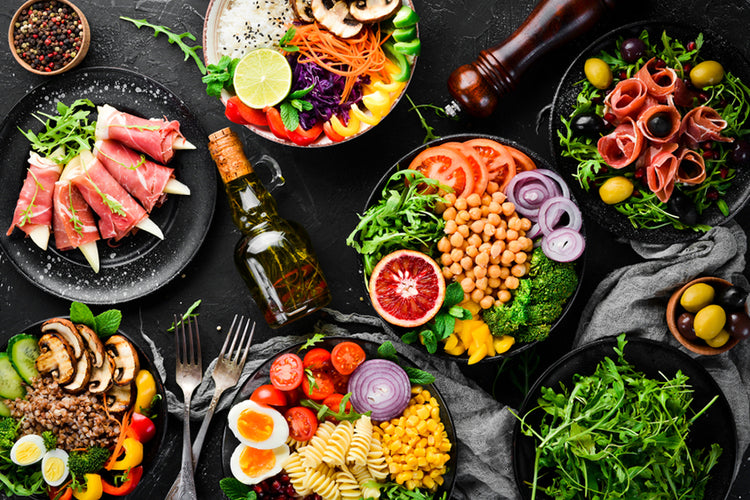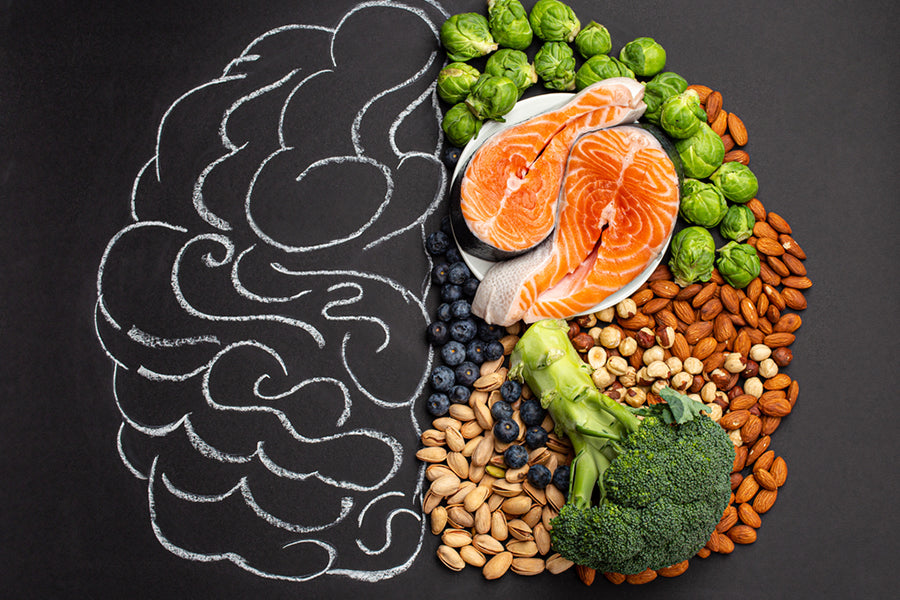Once upon a time, in a bustling city filled with people consumed by the daily grind, there lived a young woman named Emily. She had a smile that could light up a room, but deep inside, she struggled with bouts of anxiety and low moods.
Despite her best efforts to stay positive, she couldn't shake off the cloud of negativity that seemed to follow her everywhere.
One day, while browsing through an old bookstore, Emily stumbled upon a hidden gem tucked away on a dusty shelf-a book titled "The Role of Nutrition in Mental Health: Foods and Nutrients for a Healthy Mind." Intrigued by the promise of a healthier mind, she eagerly flipped through the pages, and a world of possibilities unfolded before her.
As Emily delved into the pages, she discovered a fascinating truth: the food she consumed had the power to influence not only her physical well-being but also her mental state. It was as if a veil had been lifted, revealing a path toward inner harmony and emotional balance.
The book took her on a journey through the intricacies of the mind-gut connection, where she learned that her gut health played a crucial role in her mental wellness. The foods she chose to nourish her body directly impacted her mood, cognition, and overall mental resilience.
With each turn of the page, Emily discovered a plethora of nutrient-rich foods that could be her allies in the battle against stress and anxiety.
Vibrant fruits and vegetables brimming with antioxidants, omega-3 fatty acids found in fatty fish like salmon, and the humble yet mighty nuts and seeds that provided essential vitamins and minerals-all held the potential to unlock a newfound sense of calm and vitality within her.
As Emily embarked on her own culinary adventure, she embraced a colorful array of nutrient-dense meals. She savored each bite, knowing that she was nourishing not only her body but also her mind. Her plates became a canvas of vibrant greens, succulent berries, and nourishing whole grains, all carefully chosen to nurture her mental well-being.
With time, Emily began to notice subtle shifts in her mood. The once-constant cloud of anxiety began to dissipate, replaced by moments of serenity and clarity. She discovered that a well-nourished mind was a powerful force capable of weathering life's storms with resilience and grace.
Emily's journey taught her that the path to mental wellness extended far beyond mere willpower. It was a holistic approach that embraced the healing power of nutrition.
She realized that by fueling her body with the right foods, she could create a solid foundation for her mental well-being-a foundation built on self-care, compassion, and a deep understanding of the connection between what we eat and how we feel.
From that day forward, she embarked on a mission to share her knowledge and help others discover the transformative potential of nutrition in nurturing a healthy mind. And so, the story of Emily serves as a gentle reminder that our plates can be more than just vessels for sustenance.
They hold the power to shape our emotions, thoughts, and overall well-being. By embracing the remarkable role of nutrition in mental health, we can embark on a journey towards inner balance, resilience, and a life filled with joy and clarity.
It's time to turn the page and discover the foods and nutrients that can fuel our own tales of mental wellness. Are you ready to embark on this transformative adventure? Let's begin.
The Mind-Body Connection: How Nutrition Affects Mental Health

In Emily's quest to understand the intricate link between nutrition and mental health, she stumbled upon a fascinating revelation-the profound impact of food on the mind. As she delved deeper into the research and insights shared by experts in the field, she discovered that what we eat can significantly influence our mental well-being.
One key aspect that caught Emily's attention was the role of neurotransmitters-the chemical messengers in the brain that regulate mood, emotions, and cognitive function. Certain nutrients, such as amino acids, vitamins, and minerals, act as building blocks for these neurotransmitters.
For example, tryptophan, found in foods like turkey, dairy, and bananas, is essential for producing serotonin, a neurotransmitter associated with feelings of happiness and well-being.
Moreover, Emily learned about the intricate connection between the gut and the brain. The gut-brain axis, as it is commonly referred to, highlights the bidirectional communication between the gastrointestinal tract and the central nervous system.
The health and diversity of the gut microbiota, the trillions of microorganisms residing in our digestive system, play a crucial role in this communication. Certain dietary choices, such as consuming fiber-rich foods, fermented foods, and prebiotics, can support healthy gut microbiota, positively influencing mental health.
Emily also discovered the impact of inflammation on mental well-being. Chronic inflammation, often triggered by a poor diet high in processed foods, sugar, and unhealthy fats, has been associated with an increased risk of mental health disorders such as depression and anxiety.
On the other hand, consuming an anti-inflammatory diet rich in fruits, vegetables, whole grains, and healthy fats can help reduce inflammation and promote a more stable and balanced mood.
As Emily delved further into her research, she realized there was no one-size-fits-all approach to nutrition and mental health. Each person's needs and preferences were unique, and finding the right balance required a personalized approach. It was clear that making informed choices about food and nutrition played a crucial role in nurturing a healthy mind.
With this newfound knowledge, Emily felt empowered to take charge of her mental well-being through the foods she consumed. She was eager to explore the specific foods and nutrients that could support her mental health and enhance her overall quality of life.
In the next section, she will dive deeper into the specific foods and nutrients that play a vital role in promoting a healthy mind.
Essential Foods and Nutrients for a Healthy Mind

Understanding the impact of nutrition on mental health led to Emily's exploration of specific foods and nutrients that could support a healthy mind. As she delved deeper, she discovered a plethora of options that could positively influence mental well-being. Here are some essential foods and nutrients to consider incorporating into your diet:
Omega-3 Fatty Acids
Omega-3 fatty acids are essential fats that have anti-inflammatory properties and have been associated with better cognitive function and mood. Foods rich in omega-3 fatty acids include fatty fish such as salmon, mackerel, and sardines, chia seeds, flaxseeds, and walnuts.
However, it can sometimes be challenging to obtain enough omega-3s through diet alone. That's where a high-quality supplement like Omega 3 Fish Oil by DMoose can be beneficial. This premium fish oil supplement is sourced from wild-caught fish and is rich in EPA and DHA, two essential omega-3 fatty acids.
By incorporating Omega 3 Fish Oil by DMoose into your daily routine, you can ensure an adequate intake of these essential fats, supporting brain health, mood regulation, and overall well-being. Trust the quality and purity of Omega 3 Fish Oil by DMoose to provide you with the Omega-3 fatty acids your body needs for optimal mental health.
Related Article: The Importance of Omega-3s in Brain Health and Overall Well-Being
B Vitamins
B vitamins, particularly vitamins B6, B12, and folate, are essential for brain health and the production of neurotransmitters. Foods rich in B vitamins include leafy greens, legumes, fortified cereals, and animal products such as eggs, meat, and dairy.
Antioxidant-Rich Foods

Antioxidants help protect the brain from oxidative stress and inflammation. Include a variety of colorful fruits and vegetables in your diet, such as berries, citrus fruits, spinach, kale, and bell peppers.
Related Article: Eat These 7 Incredible Foods to Boost Your Immunity
Complex Carbohydrates
Opt for complex carbohydrates like whole grains, which provide a steady release of glucose to the brain. This helps maintain stable energy levels and supports optimal cognitive function. Incorporate foods like quinoa, brown rice, oats, and whole-grain bread into your meals.
Probiotic-Rich Foods
As mentioned earlier, gut microbiota plays a crucial role in mental health. Probiotic-rich foods like yogurt, kefir, sauerkraut, and kimchi can promote healthy gut microbiota, positively impacting mood and overall well-being.
In addition to natural food sources, incorporating a high-quality probiotic supplement, such as Probiotic by DMoose, can provide a convenient and effective way to support your gut health. This carefully formulated probiotic supplement contains a blend of beneficial bacteria strains that can help restore and maintain a healthy balance of gut microbiota.
By incorporating Probiotic by DMoose into your daily routine, you can optimize your gut health and potentially experience the mental health benefits associated with a balanced microbiome.
Remember, while these foods and nutrients can support a healthy mind, they are not a magical solution. A balanced diet, rich in a variety of whole foods, is essential for overall well-being.
The next section will explore practical strategies to incorporate these foods and nutrients into your daily routine, helping you optimize your nutrition for a healthy mind and body.
Practical Strategies for Optimal Nutrition

Now that you have a better understanding of the role of nutrition in mental health and the essential foods and nutrients to prioritize, it's time to explore practical strategies to incorporate them into your daily routine. Here are some tips to help you optimize your nutrition for a healthy mind and body:
Meal Planning and Preparation
Plan your meals in advance to ensure you include a variety of nutritious foods. Batch cooking and meal prepping can save time and make healthy eating more convenient throughout the week.
Mindful Eating
Practice mindful eating by slowing down and savoring each bite. Pay attention to your body's hunger and fullness cues, and eat without distractions. This can help you better tune in to your body's needs and make conscious food choices.
Hydration
Stay adequately hydrated by drinking enough water throughout the day. Ensuring you stay hydrated is crucial for your mental and physical health. Drinking at least 8 cups or 64 ounces of water each day is recommended.
Smart Snacking
Choose nutrient-dense snacks that balance macronutrients and keep you satisfied between meals. Opt for options like Greek yogurt with berries, a handful of nuts and seeds, or sliced veggies with hummus.
Diversify Your Plate
It's essential to have a colorful and diverse plate to boost your mental and physical health. Make sure to include a variety of fruits, vegetables, whole grains, lean proteins, and healthy fats to get a wide range of nutrients.
Remember, nutrition is just one piece of the puzzle when it comes to maintaining mental health. Prioritizing regular physical activity, getting enough sleep, managing stress levels, and seeking support when needed are also crucial components of a holistic approach to well-being.
In the final section of this article, we will discuss additional lifestyle factors that complement a nutritious diet and contribute to overall mental wellness. Stay tuned for valuable insights and practical tips to cultivate a healthy mind and body.
Cultivating a Healthy Mind and Body: Beyond Nutrition

While nutrition is vital in promoting mental health, other lifestyle factors contribute to overall well-being. It's essential to consider these additional aspects:
Regular Physical Activity
Regular exercise has numerous benefits for mental health. Exercise helps release endorphins, which are known as "feel-good" hormones, and can alleviate symptoms of stress, anxiety, and depression. Find activities you enjoy, such as walking, jogging, cycling, dancing, or participating in sports.
Quality Sleep
Adequate sleep is essential for mental health and cognitive function. Aim for 7-9 hours of quality sleep each night. Create a relaxing bedtime routine, limit electronic devices before bed, and ensure your sleep environment is comfortable and conducive to restful sleep.
Stress Management
Chronic stress can take a toll on mental health. Explore stress management techniques that work for you, such as mindfulness meditation, deep breathing exercises, yoga, or engaging in hobbies and activities that help you relax and unwind. Prioritize self-care and find healthy outlets to cope with stress.
Social Connection
Building and maintaining positive relationships is crucial for mental well-being. Seek social support from friends, family, or support groups. Engage in activities that allow for social interaction, such as joining clubs, volunteering, or participating in community events.
Seek Professional Help
If you're struggling with mental health issues, don't hesitate to seek professional help. A mental health professional can provide guidance, support, and therapeutic interventions tailored to your specific needs.
Incorporating these lifestyle factors alongside a balanced and nutritious diet can enhance your overall mental wellness and cultivate a healthy mind and body. Remember, everyone's journey to mental well-being is unique. Finding the best strategies and practices that work best for you may take time. Be patient, compassionate towards yourself, and embrace the process of self-discovery and self-care.
The Bottom Line
The role of nutrition in mental health cannot be overstated. The foods we consume directly impact our brain chemistry and can significantly influence our mood, cognition, and overall mental well-being.
Adopting a balanced and nutrient-rich diet and incorporating foods supporting brain health can enhance our mental resilience and promote optimal brain function. However, it's essential to recognize that nutrition is just one piece of the puzzle. A comprehensive approach to mental health includes other factors such as physical activity, stress management, sleep quality, and social connection.
We can create a solid foundation for mental well-being by addressing these aspects holistically. Remember, everyone's journey to mental health is unique, and it may take time to find the specific strategies and practices that work best for you. It's important to seek support, whether it's from a healthcare professional, a registered dietitian, or a mental health counselor, who can provide personalized guidance and support along the way.
So, let us embark on this transformative journey towards a healthy mind by embracing the power of nutrition and holistic lifestyle choices. Together, we can nourish our bodies and minds, fostering resilience and cultivating a vibrant and fulfilling life.
Reading List
Article Sources
- Dahiya, Divakar, and Poonam Singh Nigam. "The Gut Microbiota Influenced by the Intake of Probiotics and Functional Foods with Prebiotics Can Sustain Wellness and Alleviate Certain Ailments like Gut-Inflammation and Colon-Cancer." Microorganisms, vol. 10, no. 3, Mar. 2022, p. 665. www.mdpi.com, https://doi.org/10.3390/microorganisms10030665.
- Firth, Joseph, et al. "Food and Mood: How Do Diet and Nutrition Affect Mental Wellbeing?" BMJ, vol. 369, June 2020, p. m2382. www.bmj.com, https://doi.org/10.1136/bmj.m2382.
- Sofyan, Marwan, et al. "B Vitamins, Work-related Stress and Emotional Mental Disorders: A Cross-sectional Study among Nurses in Indonesia." Nursing Open, vol. 9, no. 4, July 2022, pp. 2037-43. DOI.org (Crossref), https://doi.org/10.1002/nop2.1213.
- Wu, Liquan, et al. "Targeting Oxidative Stress and Inflammation to Prevent Ischemia-Reperfusion Injury." Frontiers in Molecular Neuroscience, vol. 13, 2020. Frontiers, https://www.frontiersin.org/articles/10.3389/fnmol.2020.00028.














